ELINA KESTILÄ-KEKKONEN
Citizens in the Nordic countries have traditionally placed much trust in political institutions and actors. Finland is no exception. Levels of trust in parliament, parties and politicians have been relatively stable in Finland over the past 15 years – at least when compared to other European countries.
The European Social Survey has gathered public opinion data for more than a decade. In terms of political trust, there have been temporary ups and downs in Finland. This is evident from Figures 1–3 where mean trust in the national parliament, political parties and politicians are reported. Respondents indicated the level of trust on a scale from 0 (“no trust at all”) to 10 (“complete trust”).
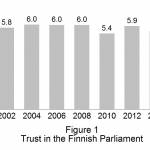
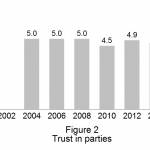
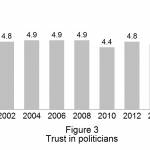
In late 2010, there was a noticable drop in trust levels by about 0.5 points for each trust indicator. The major reason, we argue, is the economic downturn which started in the autumn of 2008 and worsened in 2009. Another reason is the campaign funding scandal that erupted around the same time.
By 2012, much of the confidence in political institutions and actors had been restored, in part because the economy had somewhat recovered. But this was only a temporary bounce-back. The ESS survey conducted in late 2014 and early 2015 shows that political trust dropped again, but not as much as in 2010. This drop occurred during the build-up to the April parliamentary election when citizens were generally dissatisfied with the incumbent government.
Political trust has nevertheless been stable in Finland, at least when compared to other European countries. Figures 4–6 report the means for trust in parliament, parties and politicians for the participating countries. A grey dot represents the mean of responses for each survey in a certain country, while a black dot is the mean of all surveys conducted in a country.
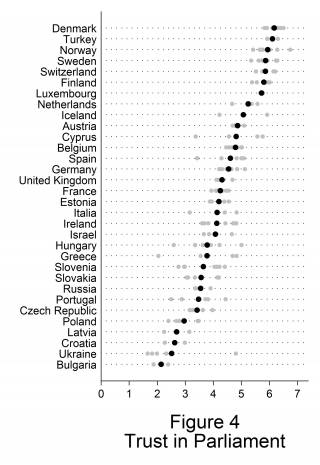
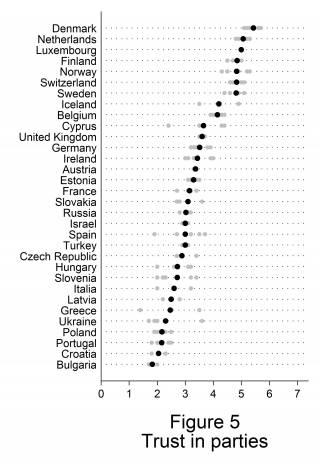
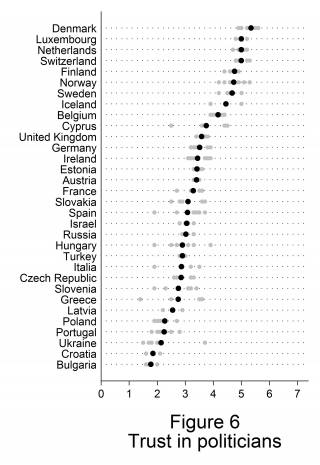
First, the variation around the mean is small for Finland compared to other countries. Second, Finland ranks high in Europe in terms of overall trust levels: 6th place for trust in parliament, 4th place for trust in parties and 5th place for trust in politicians.
The Nordic countries are among the top-8 countries together with Netherlands, Switzerland and Luxembourg. Denmark has the largest average for all three trust indicators. Finland, Norway and Sweden have similar scores, while Iceland has somewhat lower scores.
High political trust in the Nordic countries is often explained by the Nordic welfare state model, which promotes equality and universal welfare programmes. Both these attributes are essential for building social trust, another important explanatory variable of political trust. Furthermore, the corruption level in the Nordic countries is comparatively very low, and has been seen as a prerequisite for the continuously high political trust in the Nordic countries.
In 2015 Finland was the second least corrupt country according to Transparency International, just after Denmark. Our Nordic neighbors were also successful in the ranking: Sweden as the third and Norway as the fifth least corrupt country in the world.
For a society built on trust, solving the problems in economically and socially hard times is easier. High trust makes the institutions work effectively, facilitates social and economic exchange, moderates transaction costs in markets and reduces the need for control and supervision.
However, we should be careful in drawing the conclusion that the higher the trust in society, the better for society. Distrust is, in fact, an integral part of a healthy democracy. Continuous loyalty to those in power makes people blind and incapable to realistically evaluate the incumbents and their actions.
Instead, for democracy to function as it should, it needs ‘informed skepticism’, that is to say, citizens capable to critically evaluate both the decision-makers and the decisions that they make.
Adjunct professor, Ph.D. Elina Kestilä-Kekkonen is a University Lecturer at the University of Tampere and leads the Consortium of Trust Research (CONTRE). Her main research interests lie in the fields of electoral behaviour, political parties and political engagement.


Indeed, Finland is a society built on trust, and people do share the feeling that government can solve the problems in economically and socially hard times. I sometimes thing that people look at the government as a solution to all problems and avoid a sense of personal responsibility.
Hank Drismayer
28.11.2017 22:43